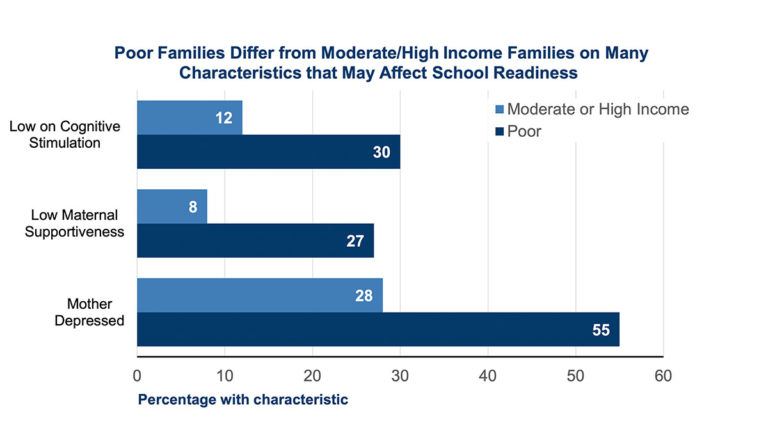Mothers and Money
Relationships between mothers and their children are particularly vulnerable when family money is short, which can affect childhood development.

Read Time: 2 minutes
Published:
The United States Census Bureau uses income level and family size to determine whether an individual falls below the poverty line. But the implications of poverty stretch beyond financial resources or lack thereof. Poverty strains important relationships.
Relationships between mothers and their children are particularly vulnerable when family money is short. Being extremely poor increases the risk of maternal depression, which in turn affects successful bonding between mother and child.
As shown in the graph, poor families are more than twice as likely to have mothers living with depression whose children who experience low-maternal supportiveness and low cognitive stimulation (reading books, telling stories, singing songs). This relationship between poverty, maternal depression, childhood development, and economic mobility perpetuates a cycle of poverty.
A recent publication by the Brookings Institution reported that children with depressed mothers have lower IQ scores than their counterparts whose mothers are not depressed. While socioeconomic status is determined by a number of factors, studies have shown that IQ is correlated with educational and occupational attainment. This developmental gap affects economic mobility over a child’s lifetime.
Addressing maternal depression and strengthening the mother-child relationship is critical to breaking the cycle of intergenerational poverty. Initiatives such as Legacy for Children and The Massachusetts Child Psychiatry Access Program for Moms (MCPAP) recognize the importance of healthy relationships between mother and child. Legacy for Children assists mothers with developing emotionally healthy relationships by setting parenting goals while MCPAP equips physicians with the tools necessary to address mothers’ concerns about mental health and substance use. Through their efforts, these programs promote maternal and child health by enhancing parent-child closeness.
Databyte via Reeves, Richard V., and Eleanor Krause. The Effects of Maternal Depression on Early Childhood Development and Impacts for Economic Mobility. Brookings Institute, 2019.



